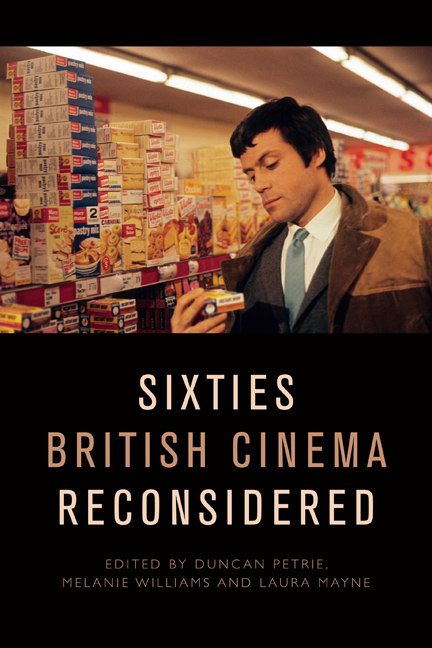Book contents
- Frontmatter
- Contents
- List of Figures and Tables
- Notes on the Contributors
- Introduction
- PART ONE STARS AND STARDOM
- 1 Male Stardom in 1960s British Cinema
- 2 ‘Rebel Rebel’?: Oliver Reed in the 1960s
- 3 Carol White: The Bardot of Battersea
- 4 ‘The Old Wave at Work’: The Transatlantic Stardom of the British Character Actress in the 1960s
- PART TWO CREATIVE COLLABORATIONS
- 5 Woodery-pokery: Charles Wood’s Sixties Screenwriting
- 6 ‘Beyond Naturalism’: Jocelyn Herbert, If . . . (1968) and Design for Performance in 1960s British Cinema
- 7 Kes: From Page to Screen
- 8 ‘I’d like to remember you as you are – as just a grumpy old man’: Joseph Losey and the Making of Figures in a Landscape (1970)
- PART THREE STYLE AND GENRE
- 9 ‘Wholesome rough stuff’: Hammer Films and the ‘A’ and ‘U’ Certificate, 1959–65
- 10 Widescreen Pyrotechnics: Shot Composition and Staging in the Cold War Films of Joseph Losey and Sidney J. Furie
- 11 The Rise and Fall of the Colourful Corporate Fantasy in 1960s British Cinema
- 12 Witchfinders and Sorcerers: Sorcery and Counterculture in the Work of Michael Reeves
- PART FOUR CULTURAL TRANSFORMATIONS
- 13 ‘An Impulse of Anger, Instantly Regretted’: Rebellion and Reaction in the Early-1960s Naval Film
- 14 Narratives of Race and Identity in Sixties British Cinema
- 15 Panic at the Disco: Brainwashing, Alienation and the Discotheque in Swinging London Films
- Index
15 - Panic at the Disco: Brainwashing, Alienation and the Discotheque in Swinging London Films
Published online by Cambridge University Press: 22 September 2020
- Frontmatter
- Contents
- List of Figures and Tables
- Notes on the Contributors
- Introduction
- PART ONE STARS AND STARDOM
- 1 Male Stardom in 1960s British Cinema
- 2 ‘Rebel Rebel’?: Oliver Reed in the 1960s
- 3 Carol White: The Bardot of Battersea
- 4 ‘The Old Wave at Work’: The Transatlantic Stardom of the British Character Actress in the 1960s
- PART TWO CREATIVE COLLABORATIONS
- 5 Woodery-pokery: Charles Wood’s Sixties Screenwriting
- 6 ‘Beyond Naturalism’: Jocelyn Herbert, If . . . (1968) and Design for Performance in 1960s British Cinema
- 7 Kes: From Page to Screen
- 8 ‘I’d like to remember you as you are – as just a grumpy old man’: Joseph Losey and the Making of Figures in a Landscape (1970)
- PART THREE STYLE AND GENRE
- 9 ‘Wholesome rough stuff’: Hammer Films and the ‘A’ and ‘U’ Certificate, 1959–65
- 10 Widescreen Pyrotechnics: Shot Composition and Staging in the Cold War Films of Joseph Losey and Sidney J. Furie
- 11 The Rise and Fall of the Colourful Corporate Fantasy in 1960s British Cinema
- 12 Witchfinders and Sorcerers: Sorcery and Counterculture in the Work of Michael Reeves
- PART FOUR CULTURAL TRANSFORMATIONS
- 13 ‘An Impulse of Anger, Instantly Regretted’: Rebellion and Reaction in the Early-1960s Naval Film
- 14 Narratives of Race and Identity in Sixties British Cinema
- 15 Panic at the Disco: Brainwashing, Alienation and the Discotheque in Swinging London Films
- Index
Summary
To stand in a pop club in any of the world's larger cities in these days is to experience a sensation rather like that of being suspended over a vat of boiling oil.
Jeff Nuttall, Bomb Culture (1968)[W]hat is certainly a major art form of the future could emerge just as well as a brain-washing nightmare.
Robert E. L. Masters and Jean Houston, Psychedelic Art (1968)British post-war youth culture flourished amid jazz bars, basement clubs and coffee bars, social spaces catering to a new group of young people with small yet expendable incomes. Progenitors of the discotheques that came to define the cultural mythology of Swinging London in the 1960s, these were more than just venues for dancing and live music. Rather, they functioned as meeting places where young people could define and explore their countercultural affiliation. A number of post-war British films about youth culture portray the beat club or expresso bar as an integral feature in advancing subcultural practices. In The Tommy Steele Story (1957), Expresso Bongo (1959), Beat Girl (1959), Sapphire (1959) and The Party's Over (1965), the beat club or coffee bar provides the setting for energetic musical sequences and group expressions of generational disaffiliation, such as jiving, smoking, and intense encounters with rock ‘n’ roll music. Cinematic representations of this early youth culture often use such environments to stress the social problems of juvenile delinquency.
By the mid-1960s, jazz clubs and coffee bars were replaced by discotheques as prominent locations in films about youth culture. Preceding and then briefly overlapping with the emergence of psychedelia as a musical and aesthetic phenomenon, disco theques had, in this period, become increasingly intermedial, merging live and moving image performances such as experimental theatre and dance, light shows, and film and moving slide projections. Although many of these spaces played a tangible role in establishing and developing underground social networks closely connected to mod, rocker, beat and hippy subcultures, they also became part of the popular cultural mythology surrounding Swinging London.
‘Swinging London’ is often mobilised as a critical framework to describe the commercial explosion of youth scenes and fashion and music cultures in mid-1960s London, marking a transitional moment in which interconnected subcultures became a part of the dominant culture, at least in terms of their media exposure.
- Type
- Chapter
- Information
- Sixties British Cinema Reconsidered , pp. 239 - 254Publisher: Edinburgh University PressPrint publication year: 2020



